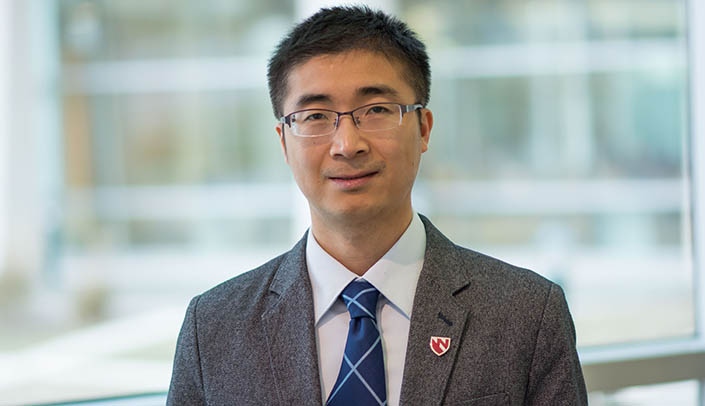When Bin Duan, Ph.D., was in college, he saw a picture of an artificial human ear growing on the back of a mouse. That photo was a window into his future.
Collaborations are key to research success
Multidisciplinary collaborations are prime fodder for breakthroughs and Bin Duan, Ph.D., assistant professor, cardiovascular medicine/Holland Regenerative Medicine Program, craves more.
He now collaborates with Philipp Streubel, M.D., associate professor, orthopaedic surgery and Patrick Reid, Ph.D., assistant professor, pathology/microbiology for two National Institutes of Health (NIH) grants. His grants include:
- NIH five-year, $1.9 million R01 grant with Dr. Steubel to regenerate tendons.
- NIH two-year, $400,000 R21 grant with Dr. Reed develop a vasculalrized bone model to study how the Chikungunya virus affects bone cells in the hopes of developing a vaccine or treatment.
- American Heart Association Scientist Development Award – a three-year, $200,000 grant to study how young and adult stem cells can differentiate and develop into a heart valve.
Dr. Duan received his Ph.D. degree from the University of Hong Kong in 2010, after which he came to the U.S. and pursued postdoctoral training in the Department of Biomedical Engineering at Cornell University. Dr. Duan joined UNMC in 2015 and also holds courtesy appointments in the Department of Surgery-Transplant at UNMC and Department of Mechanical Engineering at the University of Nebraska-Lincoln.
“The idea of fabricating engineered tissues and organs for transplantation and therapeutic use was fantastic,” he said. “I already was strongly interested in tissue engineering and regenerative medicine and I saw how this could one day help patients.”
Dr. Duan assistant professor, cardiovascular medicine/Holland Regenerative Medicine Program, has devoted his research to making that day happen and today (March 14) his research will be recognized with the presentation of the Joseph P. and Harriet K. Gilmore Distinguished New Investigator Award. The ceremony and symposium will be held at 2:30 p.m. on March 14 in the Buffett Cancer Center Conference Room 101.
“I am excited and honored to receive this award,” Dr. Duan said. “I define myself more as an engineer than a scientist, so this is quite an honor.”
He’s not growing ears in his Biomaterial, Biofabrication and Biointerface Lab, but he is encouraging the regeneration of bones, tendons and cardiovascular tissues in the dishes and in animal models through the use of various stem cells.
3D printing is one of the advanced technologies Dr. Duan and his team are using and developing. This promising fabrication technique can make three dimensional objects with complex shapes from a digital file. Dr. Duan’s group is using biomaterials and cells as building blocks to print engineered human tissues.
In collaboration with other multidisciplinary teams of experts, his lab aims to translate these cutting-edge technologies, devices and materials into the clinics.
“I highly appreciate my collaborators. With their help, we can better define the clinical questions and solve important clinical problems” Dr. Duan said.
